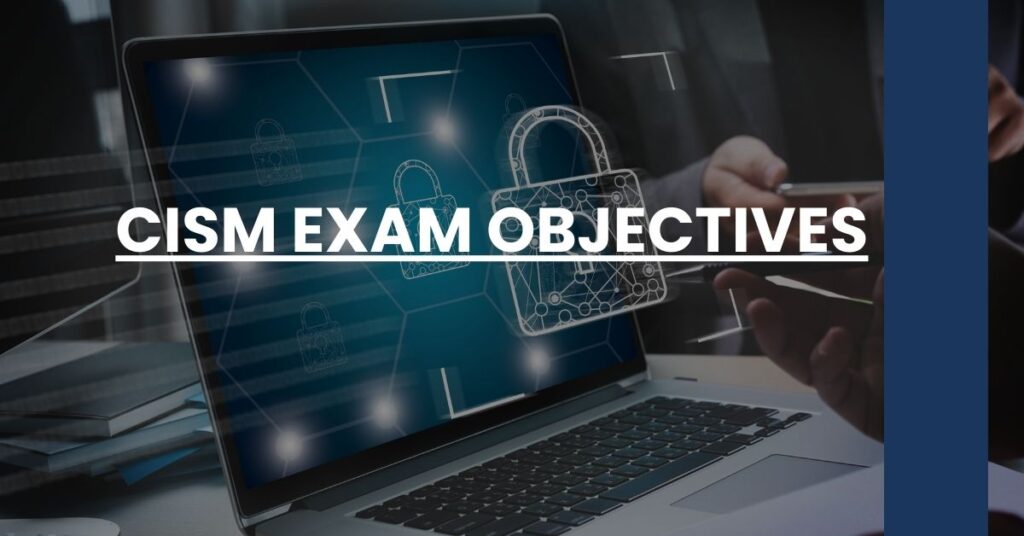The CISM (Certified Information Security Manager) exam focuses on four core objectives: crafting and governing information security policies, managing risks, developing and overseeing security programs, and responding to security incidents effectively.
Ready to conquer the CISM exam? You’ll find insight into:
- Building a robust security governance structure
- Mastering the art of information risk management
- Developing comprehensive security programs
- Navigating incident management with precision
With these cornerstones, the CISM certification sets the stage for elevating your information security leadership and opens a gateway to advanced career opportunities in the cybersecurity realm.
- Understanding the CISM Certification
- The CISM Exam Overview
- Domain 1: Information Security Governance
- Domain 2: Information Risk Management
- Domain 3: Information Security Program Development and Management
- Domain 4: Information Security Incident Management
- Exam Preparation Tips
- The Importance of CISM for Career Advancement
- Frequently Asked Questions
- Navigating Resources and Support
- Conclusion: Embracing the Challenge
Understanding the CISM Certification
The Certified Information Security Manager (CISM) is a certification that sets the global benchmark for excellence in the field of information security management. Administered by ISACA, it’s a testament to your understanding of the complex dynamics that shield an organization from cyber threats and your ability to manage and adapt its information security program.
Earning the CISM certification demonstrates a commitment to compliance, security governance, and risk management—the triad that ensures an organization’s information assets are well-protected. So, when you decide to embark on this journey, you’re not just enhancing your career prospects; you’re aligning yourself with the global best practices of information security management.
The CISM is designed for those who manage, design, oversee, and/or assess an enterprise’s information security. Whether you are an experienced information security manager or aspire to transition into a managerial role, this certification is your way of communicating professional excellence and a sound understanding of the relationship between an information security program and broader business goals.
The CISM Exam Overview
Stepping into the CISM exam, you’re looking at a challenge that requires both depth of knowledge and practical application. The exam itself is a comprehensive test of your expertise, comprising 150 multiple-choice questions that you need to tackle over a 4-hour session.
To ensure your success, you need to understand the four domain areas that form the cism exam objectives:
- Information Security Governance
- Information Risk Management
- Information Security Program Development and Management
- Information Security Incident Management
These domains cover everything from establishing and ensuring the governance framework to the development of policies that protect information assets, all of which feed into a cohesive strategy managing security risks effectively.
Domain 1: Information Security Governance
To set the stage for a formidable security posture, an enterprise must have robust governance in place. As you delve into this domain, brace yourself to dissect policies, principles, and frameworks that underpin the governance of information security. Your objective here is to comprehend and apply concepts that ensure security governance aligns with business goals and adds value to the organization.
You will be expected to master the art of developing and maintaining an information security strategy that resonates with organizational directives. This may include:
- Establishing information security governance frameworks
- Understanding legal and regulatory issues that pertain to information security
- Developing business cases justifying investment in information security
- Integrating information security governance into corporate governance practices
As the ISACA exam content outline suggests, this isn’t just about learning the theory; you’ll be applying your knowledge to real-world scenarios, ensuring security governance serves as a foundation for protecting information assets.
Domain 2: Information Risk Management
If there’s one certainty in the information security realm, it’s that risks are inevitable. Hence, your next domain revolves around identifying, evaluating, and the management of these risks, ensuring that the security strategy remains resilient against potential threats.
This domain demands that you digest:
- The process of assessing vulnerabilities and their potential impacts
- Risk assessment methodologies
- Strategies for mitigation
- The integration of risk management into the business process
Competency in information risk management means embracing a proactive stance—foreseeing risks and mitigating them in alignment with the overall security governance. Here, your abilities to assess, analyze, and communicate risks effectively are key; they ensure that risk management feeds into decision-making processes, influencing the safety net that’s laid out for information security.
Domain 3: Information Security Program Development and Management
Navigating the complexities of information security demands not just a strategic plan but also the ability to implement and manage an effective security program. Throughout this domain, you’ll concentrate on establishing, managing, aligning, and assessing information security programs. It’s where governance meets the ground, and your leadership skills come to the forefront.
You’ll be covering:
- The process of defining an information security strategy
- Standards, procedures, and guidelines that align with security strategy
- The significance of effective security awareness and training programs
- Technologies and processes that drive security across the organization
There’s a constant need for your program to reflect the evolving business framework and technological landscape. Building and managing security tools and their corresponding policies ensures the guardrails you put up not only adhere to the governance framework but also robustly defend the enterprise’s information ecosystem.
As you dive into these objectives, keep in mind the dynamic nature of the discipline. The static knowledge won’t suffice; adaptability and current best practices should be your steady companions.
Domain 4: Information Security Incident Management
When a security breach occurs, how you respond can make all the difference. In this critical domain, you will explore the strategies and processes crucial for establishing a robust incident management plan—an element at the heart of the CISM exam objectives. Your responsibility will extend from the early detection of unusual activity to the swift and comprehensive response following an incident.
You’ll need to become proficient in:
- Incident management concepts: Understanding the lifecycle of an incident and the importance of prepared and measured responses.
- Resource management during an incident: Effectively allocating human, financial, and business resources to mitigate damage.
- Incident recovery plans: Developing strategies that outline not only immediate response but also long-term recovery of normal operations.
In this realm, you will stretch your skills and foresight to incorporate the lessons learned post-incident into future response plans, fulfilling a cycle of continuous improvement.
At this stage, mastering incident management isn’t just about the response; it’s also about resilience and learning. Delving into the nuances of incident management will equip you with foresight, ensuring that every incident, however small, fortifies your organization’s defense system.
As you grapple with the complexities of these scenarios, remember that your expertise not only safeguards the organization’s assets but also its reputation and continuity.
Exam Preparation Tips
The journey to achieving the CISM certification is as demanding as it is rewarding. To align your preparations with the CISM exam objectives, consider building a strategic study plan. This might include scheduling regular study times, utilizing practice exams, and actively engaging with the material.
Consider employing various study methods to suit your learning style:
- Engage with interactive resources like online forums and study groups, which provide peer support and knowledge sharing.
- Review official ISACA practice tests to familiarize yourself with the exam format and question types.
- Look into ISACA review manuals and publications that provide detailed insights into each domain.
Devise a revision schedule that allows for repetitive learning, ensuring that you are not just memorizing concepts but really understanding and internalizing them. The key is to make your preparation consistent with real-world applications, so you’ll be ready not only to pass the exam but also to apply your knowledge effectively in your career.
Finally, be mindful of your well-being; adequate rest, exercise, and a balanced diet can positively impact your cognitive abilities and memory retention leading up to the exam. By managing your physical health, you’re giving yourself the optimal conditions to tackle the mental rigors of the exam.
The Importance of CISM for Career Advancement
The CISM credential does more than showcase your decision-making and strategic skills in information security management; it can be a career game-changer. It demonstrates to employers your commitment to the profession and signifies a certain level of expertise and credibility that is recognized worldwide.
Those with a CISM certification often find doors open for them into leadership roles and have a competitive edge in the job market. Companies, recognizing the expertise that Certified Information Security Managers bring to the table, may offer higher remuneration than for non-certified counterparts. In fact, a Certified Information Security Manager can expect a salary that reflects the high demand for their specialist skills.
The heightened job security and broadened career horizons that come with a CISM certification can underpin a very successful career in information security management. Given the increasing importance of cybersecurity, CISM-certified professionals will continue to be sought-after experts ready to take on the dynamic challenges of today’s digital world.
Frequently Asked Questions
When considering taking the CISM exam, you likely have a host of questions. Let’s address a few common ones:
Am I eligible for the CISM exam? Typically, you’ll need at least five years of experience in information security management to be eligible for the exam. However, there are provisions for educational waivers which might reduce this requirement.
How many times can I take the exam if I don’t pass? ISACA allows you to retake the exam, but be aware of the retake policy, which includes associated fees and waiting periods.
What are the CPE (Continuing Professional Education) requirements? Upon earning your CISM certification, you are required to engage in continuous learning to keep your skills sharp and relevant. This involves earning CPE credits annually.
Getting to grips with the FAQs is part of laying the groundwork for your certification journey. The more you understand the process, the more focused your preparation will be.
Navigating Resources and Support
As you align your study plans with the CISM exam objectives, remember that you’re not alone on this path. ISACA provides a wealth of resources from official study materials and guides to practice questions that mirror the depth and breadth of the exam.
Moreover, engaging with a community that’s on the same path can be invaluable. Online forums and local study groups can provide moral support, study tips, and the collective wisdom of those who have already tackled the exam.
Consider reaching out to a mentor who holds the CISM certification; their insights and advice can significantly enrich your study experience. ISACA chapters globally offer networking opportunities and professional development programs that can offer both strategic and tactical support as you prepare.
Conclusion: Embracing the Challenge
Embarking on the journey to become a Certified Information Security Manager is a testament to your dedication to professional growth and a commitment to the highest standards of information security management.
From understanding the comprehensive CISM exam objectives to diligently preparing and finally achieving certification, this challenge is about more than credentials—it’s about becoming a pivotal part of the fortified backbone of any organization’s cyber defense.
Take on this challenge with determination, knowing that every concept mastered, each mock exam taken, and the entire breadth of knowledge acquired, is shaping you into a leader in the realm of information security. Embrace this opportunity assuredly, and step into the role of a CISM with confidence and the expertise to make a significant impact in the ever-evolving digital landscape.

